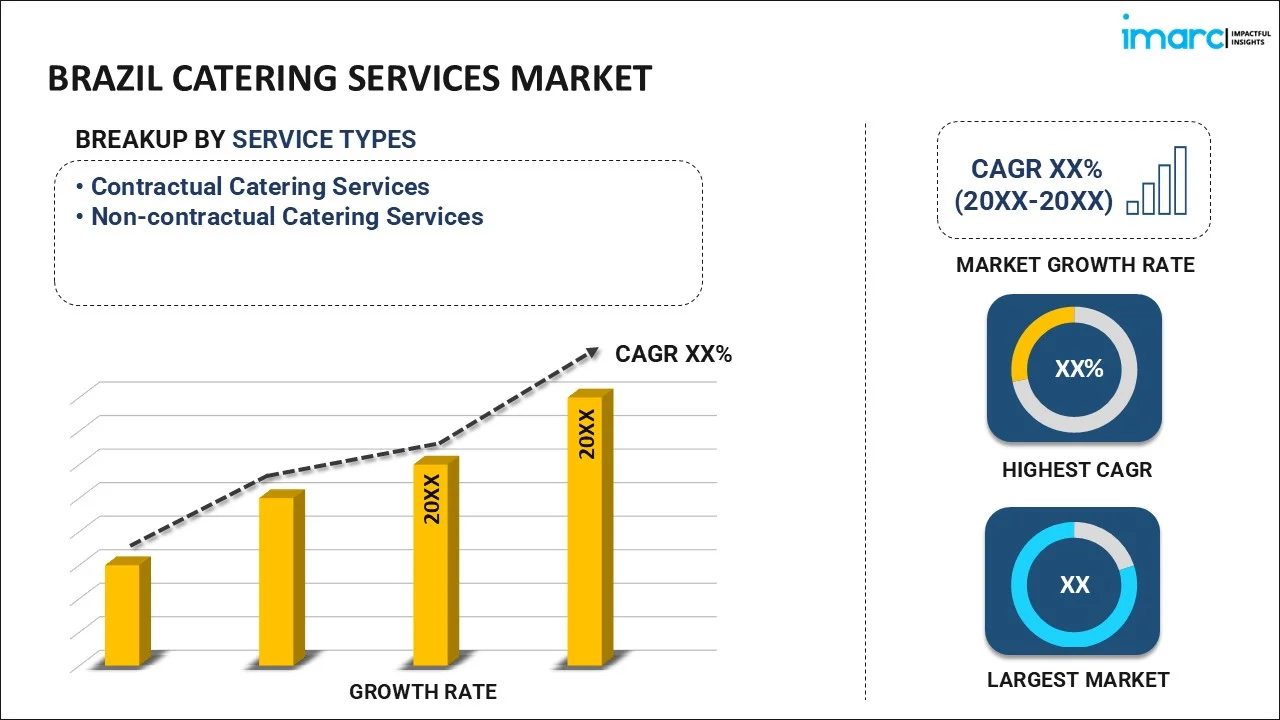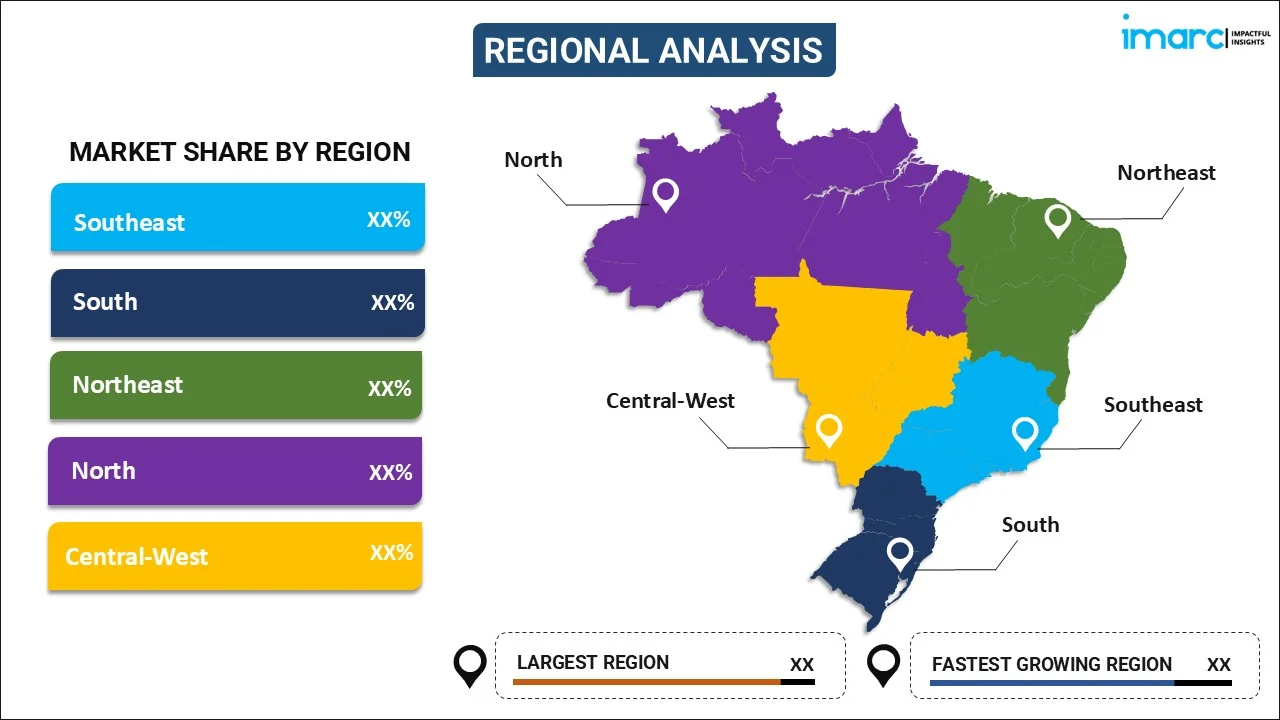
Brazil Catering Services Market Size, Share, Trends and Forecast by Service Type, End User, and Region, 2026-2034
Brazil Catering Services Market Overview:
The Brazil catering services market size reached USD 3.5 Billion in 2025. Looking forward, IMARC Group expects the market to reach USD 7.2 Billion by 2034, exhibiting a growth rate (CAGR) of 8.28% during 2026-2034. The market is primarily driven by the rising demand for corporate catering, the expansion of specialized dietary menus, increased use of technology for operational efficiency, and growing consumer preference for high-quality, personalized catering services.
|
Report Attribute
|
Key Statistics
|
|---|---|
|
Base Year
|
2025
|
|
Forecast Years
|
2026-2034
|
|
Historical Years
|
2020-2025
|
| Market Size in 2025 | USD 3.5 Billion |
| Market Forecast in 2034 | USD 7.2 Billion |
| Market Growth Rate (2026-2034) | 8.28% |
Brazil Catering Services Market Trends:
Increasing Demand for Corporate Catering Services
One significant trend in the Brazilian catering services market is the rising demand for corporate catering. Professional catering services have become more necessary as businesses prioritize employee welfare and corporate occasions. Businesses are regularly hosting meetings, conferences, and team-building activities, which makes coordinated food services that can meet a variety of dietary needs necessary. Additionally, because work-life balance and employee satisfaction are becoming more important, companies are spending on high-quality food options for everything from morning meetings to full-day events. In cities like São Paulo and Rio de Janeiro, where corporate cultures are more advanced, the catering industry is growing significantly. The rising emphasis on wellness and nutrition is reflected in the movement in corporate catering to incorporate healthier, personalized meal programs. For instance, in July 2023, Sodexo’s Pluxee partnered with Santander Brazil to expand its market leadership in employee benefits, combining 145,000 clients, 6.5 million consumers, and 750,000 merchants. The 25-year exclusive distribution deal integrates Santander’s Ben unit, boosting Pluxee’s reach. Santander will hold a 20% stake in Pluxee Brazil, pending regulatory approvals. The partnership enhances meal and food benefits, targeting SME growth.
Rising Popularity of Specialized Catering Services
The increased demand for specialized catering, particularly for occasions which require for distinctive or customized menus, is another emerging trend in the Brazil catering services market. Catering businesses are responding to consumer demands by providing more specialized services, such as vegetarian, vegan, and gluten-free options, as consumer preferences shift towards more niche diets. Specialty catering services are expanding quickly due to the rise in health-conscious consumers and the increasing interest in organic and sustainable foods. For instance, in November 2024, Brazil committed to prioritizing sustainable, plant-based food at COP30, ensuring healthy, fairly priced, and locally sourced catering. ProVeg International welcomes this move, emphasizing its climate impact, as plant-based diets reduce greenhouse gas emissions. Brazil aims to improve catering options compared to previous summits by integrating expert advice. Animal agriculture significantly contributes to deforestation and emissions, making plant-based solutions crucial. The initiative aligns with global sustainability goals and reinforces Brazil’s efforts to address environmental challenges through food choices. Additionally, there's a growing demand for themed catering, where the cuisine is tailored to fit the theme of the occasion, for weddings, cultural events, and private gatherings. This pattern mirrors a larger trend in the catering sector towards innovation and personalization, which has resulted in the creation of distinctive, high-quality services.
Rapid Adoption of Technology in Catering Services
A key development influencing the Brazilian industry is the increasing incorporation of technology into catering services. Catering businesses are using mobile apps and digital platforms in increasing numbers to handle reservations, improve client experiences, and streamline operations. Convenience and efficiency have increased with the ability for customers to simply browse menus, place orders, and customize services online. Better inventory management, cost control, and waste reduction are also made possible by technology in the catering industry. Furthermore, caterers can better understand customer preferences, optimize menus, and enhance service delivery through the use of data analytics. In addition to this, social media and digital marketing are being used to advertise services and reach a larger audience. Continual developments in technology, thus, are raising consumer satisfaction generally and increasing operational efficiency in the Brazilian catering market. For instance, in January 2024, Fratelli Cosulich do Brasil (FCdB) launched a new Technological Food Production Center and Restaurant in Brazil. Equipped with advanced 4.0 technology, it has the capacity to produce 10,000 meals daily and serve 500 meals per day at its commercial restaurant. The center will collaborate with universities to train food professionals and nutritionists, improving efficiency and food quality in the catering sector.
Brazil Catering Services Market Segmentation:
IMARC Group provides an analysis of key trends in each segment of the market, along with forecasts at the region/country level for 2026-2034. Our report has categorized the market based on service type and end-user.
Service Type Insights:

- Contractual Catering Services
- Non-contractual Catering Services
The report has provided a detailed breakup and analysis of the market based on the service type. This includes contractual and non-contractual catering services.
End-User Insights:
- Industrial
- Hospitality
- Educational
- Healthcare
- In-flight
- Others
The report has provided a detailed breakup and analysis of the market based on the end-user. This includes industrial, hospitality, educational, healthcare, in-flight, and others.
Regional Insights:

- Southeast
- South
- Northeast
- North
- Central-West
The report has also provided a comprehensive analysis of all the major regional markets, which include Southeast, South, Northeast, North, and Central-West.
Brazil Catering Services Market News:
- September 20, 2024: IFPLS (International Flight Planning Solutions) has expanded its in-flight catering services to Brazil, serving major airports like São Paulo-Guarulhos (GRU) and Rio de Janeiro-Galeão (GIG). The company offers custom menus featuring Brazilian and international dishes, premium ingredients, and catering for commercial airlines, private jets, and cargo flights. IFPLS ensures high-quality meals, timely delivery, and eco-friendly packaging. The company aims to enhance airline dining experiences with gourmet, business, and economy-class meals, along with special dietary options.
- April 22, 2024: Brazil’s GPS Group acquired local food services provider GR Serviços e Alimentação (GRSA) and its subsidiaries from UK-based Compass Group. The deal strengthens GPS Group’s presence in the catering sector. The transaction aligns with GPS Group’s expansion strategy in hospitality and food services, reinforcing its market position in Brazil’s catering sector.
Brazil Catering services Market Report Coverage:
| Report Features | Details |
|---|---|
| Base Year of the Analysis | 2025 |
| Historical Period | 2020-2025 |
| Forecast Period | 2026-2034 |
| Units | Billion USD |
| Scope of the Report |
Exploration of Historical Trends and Market Outlook, Industry Catalysts and Challenges, Segment-Wise Historical and Future Market Assessment:
|
| Service Types Covered | Contractual Catering Services, Non-contractual Catering Services |
| End Users Covered | Industrial, Hospitality, Educational, Healthcare, In-Flight, Others |
| Regions Covered | Southeast, South, Northeast, North, Central-West. |
| Customization Scope | 10% Free Customization |
| Post-Sale Analyst Support | 10-12 Weeks |
| Delivery Format | PDF and Excel through Email (We can also provide the editable version of the report in PPT/Word format on special request) |
Key Benefits for Stakeholders:
- IMARC’s industry report offers a comprehensive quantitative analysis of various market segments, historical and current market trends, market forecasts, and dynamics of the Brazil catering services market from 2020-2034.
- The research report provides the latest information on the market drivers, challenges, and opportunities in the Brazil catering services market.
- Porter's Five Forces analysis assists stakeholders in assessing the impact of new entrants, competitive rivalry, supplier power, buyer power, and the threat of substitution. It helps stakeholders to analyze the level of competition within the Brazil catering services industry and its attractiveness.
- Competitive landscape allows stakeholders to understand their competitive environment and provides an insight into the current positions of key players in the market.
Key Questions Answered in This Report
The market in the Brazil was valued at USD 3.5 Billion in 2025.
The Brazil catering services market is projected to exhibit a CAGR of 8.28% during 2026-2034, reaching a value of USD 7.2 Billion by 2034.
The market is driven by rising demand for corporate catering, expansion of specialized dietary menus including vegan and gluten-free options, rapid adoption of digital technology for operations and client experiences, and a growing consumer preference for high-quality, personalized catering services in both business and private settings.
Need more help?
- Speak to our experienced analysts for insights on the current market scenarios.
- Include additional segments and countries to customize the report as per your requirement.
- Gain an unparalleled competitive advantage in your domain by understanding how to utilize the report and positively impacting your operations and revenue.
- For further assistance, please connect with our analysts.
 Request Customization
Request Customization
 Speak to an Analyst
Speak to an Analyst
 Request Brochure
Request Brochure
 Inquire Before Buying
Inquire Before Buying




.webp)




.webp)












